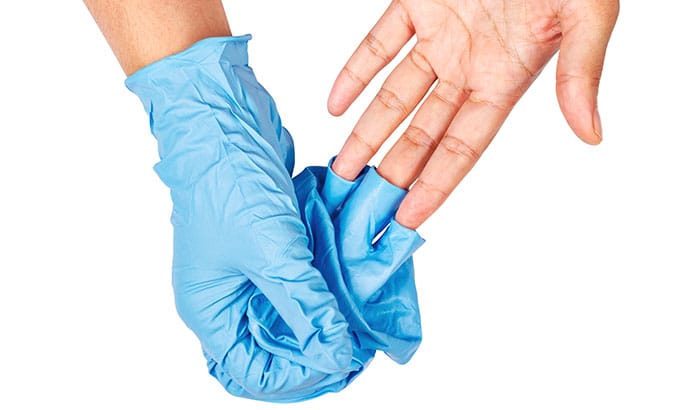Every medical practice should be stocked with disposable medical gloves to protect patients and staff against viruses, infections, and diseases. But did you know there are different types of medical gloves?
Not all disposable medical gloves are the same. They come in different acceptable quality limits (AQL), are all made from different materials, and can be used for various situations, depending on their characteristics.
We’ll cover everything you need to know about disposable medical gloves in this article to help you choose the best ones for your medical practice.
What Makes Medical Grade Gloves?
Medical-grade gloves were first designed for non-surgical procedures, often called exam gloves. Today, you’ll find these gloves anywhere from a medical research lab to operating rooms. However, not just any disposable glove can be considered medical-grade.
The United States Food and Drug Administration determines the AQL standards. To receive a lower AQL score, gloves must contain few defects. For example, exam-grade gloves must have an AQL of 2.5 or less and be able to protect against infections and diseases.
Aside from the AQL, medical glove manufacturers who wish to distribute exam-grade gloves need to receive a 510K certification, a premarket submission to the FDA that demonstrates a product’s safety and effectiveness. The certification process involves comparing the gloves to similar products.
What Makes Regular Exam Gloves?
If a manufacturer fails to meet specific AQL standards, a batch of gloves will be marked for “industrial use only.” Medical-grade gloves should provide extra strength and protection against hazards; you shouldn’t take this lightly.
None-Sterile Gloves
Some medical-grade gloves are manufactured to be “non-sterile.” These disposable medical gloves will still protect against pathogens and other hazards, but they are not made for surgical use.
The Types of Medical Grade Gloves
As mentioned, disposable medical gloves come in different styles. The most common materials used to manufacture these gloves include the following:
Latex Gloves
Latex gloves became the standard choice in healthcare in the 1940s. These medical-grade gloves are made from a natural rubber material that offers high-touch sensitivity, a comfortable fit, and added dexterity, which is excellent for surgeons.
But latex-free exam gloves are becoming the new standard as there are patients who are allergic to latex. Today, it may be safer to opt for alternatives to ensure you’re keeping all your patients safe.
Vinyl Gloves
Vinyl gloves are cheaper than latex and offer adequate protection against chemicals and biological fluids. These are an excellent option for medical professionals who change their gloves frequently, but it’s worth noting that they offer a looser fit, which sacrifices dexterity.
Nitrile Gloves
If you don’t mind spending a little more but want to avoid latex gloves, nitrile will be your best option. Nitrile medical gloves offer a nice, conforming fit, so you don’t have to sacrifice agility in exchange for a latex alternative.
Uses for Medical Grade Gloves
Medical grade exam gloves are worn by surgeons, medical lab technicians, and other professionals who come in contact with hazardous materials, chemicals, and infections.
Exam-grade gloves are the most crucial form of protection in these settings, and their protective properties make them popular amongst caregivers, tattoo artists, janitors, childcare providers, and aestheticians!
What You Should Do Before, During, and After Using Medical Gloves
Using disposable medical gloves sounds simple, but there’s more to keeping you and your patients safe than just putting them on. Here are some tips to make sure you’re getting the most out of your medical-grade gloves:
- Always wash your hands before wearing gloves.
- Make sure your gloves are the right fit so that you can wear them comfortably throughout all patient care.
- Make sure you consider latex allergies; opt for latex alternatives if you deal with an array of patients.
- Watch for sharp objects that can puncture your gloves and compromise their efficacy.
- Always change your gloves after they rip or tear.
- Wash your hands thoroughly with soap and water or an alcohol-based hand rub after removing your gloves.
- Never reuse the same pair of medical gloves.
- Never wash or disinfect medical gloves.
- Do not share medical-grade gloves with anyone.
These tips will help you get the most out of your disposable medical gloves and keep you and your patients safe from disease and bacteria.
Proper Disposable Medical Glove Storage Tips
You should store disposable medical gloves properly to help them last longer and prevent them from losing efficacy. Here are helpful tips when it comes to storing your gloves.
- Keep them in their original packaging with the seal left unbroken until you’re ready to use them. This will ensure that quality isn’t somehow compromised from exposure to the elements from a broken seal.
- Store your medical gloves in a cool-temperature environment. Heat can cause medical-grade gloves to degrade.
- Store your gloves somewhere free of ultraviolet light or ozone. Some lights can generate ozone or ultraviolet light, which can be damaging to your gloves.
- Store your disposable medical gloves in a low-humidity environment. Exposing your gloves to too much humidity can lead to mold and bacterial growth. Make sure to keep your gloves away from humidifiers, radiators, steam pipes, and other equipment that can generate heat and humidity.
Get the Supplies You Need from Allied
If you’re looking to replace your current disposable medical gloves for a better option, or if you’re just starting your practice and need to stock up on necessary supplies, reach out to us at Allied.
We carry medical supplies that every medical practice should have on hand to give their patients the best care possible. We have you and your practice covered, from disposable medical gloves to everyday office cleaning supplies!
Call us today or fill out our online form for a free quote and to see how we can buy you out of your current vendor’s contract! Let Allied help you take your medical practice to the next level. Get started today!

